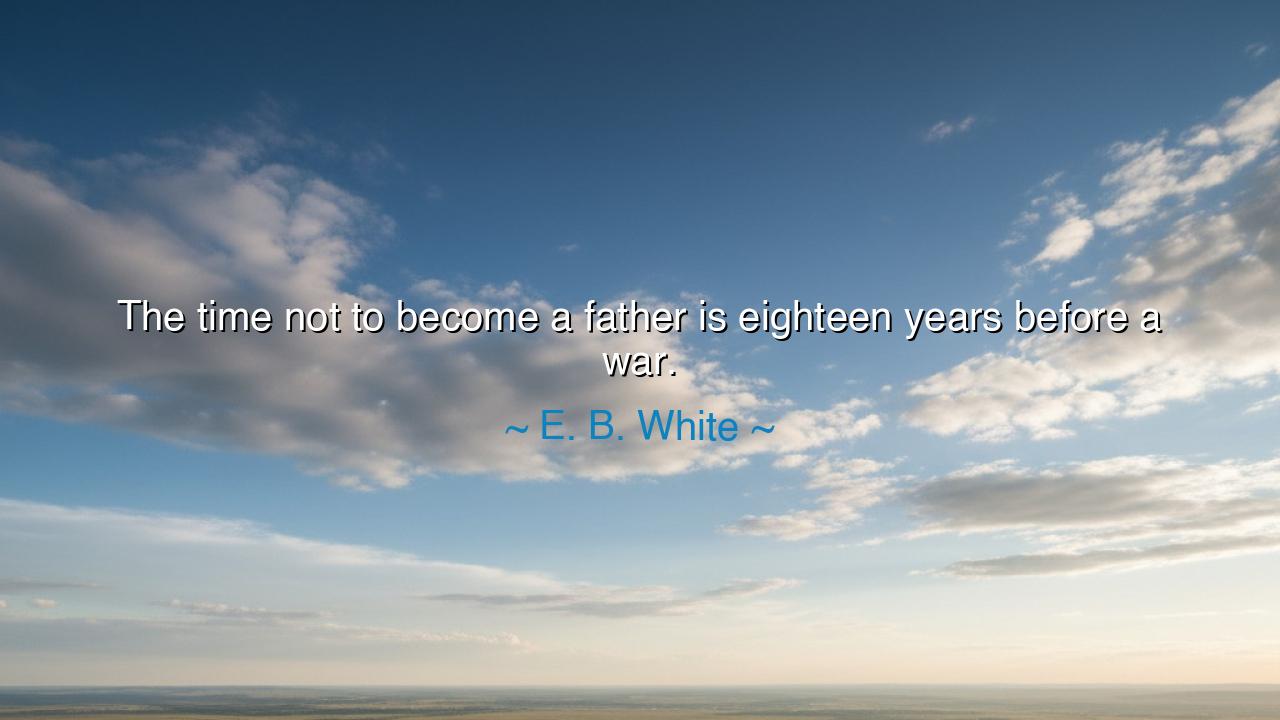
The time not to become a father is eighteen years before a war.






“The time not to become a father is eighteen years before a war.” These words, spoken by E. B. White, are steeped in sorrow and irony. Beneath their quiet wit lies the deep ache of a timeless truth — that the greatest pain of war is not suffered only by soldiers, but by fathers and mothers who must watch their children march into its jaws. The quote is not a jest, but a lament: a recognition that war devours the young, and that the heart of every parent who has ever raised a child in peace lives under the shadow of such loss.
White, who lived through the fires of two world wars, knew the cruelty of fate. His words are a cry from the conscience of humanity, a truth spoken with the calm tone of wisdom but the burning heart of grief. To say that one should not become a father “eighteen years before a war” is to say that the tenderness of parenthood is a dangerous treasure in a world that so often turns upon itself. For when the drums of war sound, it is not the old who are taken from the hearth, but the sons — the bright and untested, the laughter of their homes, the dreams of their fathers made flesh. Every father’s joy becomes his vulnerability, for love makes him mortal in ways death alone never could.
The ancients knew this agony well. In the story of King Priam of Troy, we see the living image of White’s wisdom. Priam, who fathered fifty sons, watched them fall one by one to the swords of the Greeks. When his beloved Hector was slain by Achilles, the king — once mighty, once proud — crept through the enemy’s camp to beg for his child’s body. There, kneeling before the killer of his son, he kissed the hands that had destroyed his joy. In that moment, all of Troy’s glory and ruin were contained in a father’s heart. Priam had become what White warned against: a father in the time of war, condemned to live long enough to see his love turned to grief.
War ages the soul. It turns fathers into mourners and mothers into monuments of endurance. When White speaks of timing — “eighteen years before a war” — he is naming not a number, but a cycle: the age when children are no longer children, when the world begins to demand from them its cruelest dues. A child born into peace may still be claimed by the future’s fury. Thus, the quote is both warning and lament, prophecy and prayer — that we might live to see an age where no man must fear the birth of his son because of the wars of his rulers.
And yet, even in such darkness, the human heart does not stop bringing life into the world. Perhaps it should not. For if fathers ceased to hope, the world would already be lost. The courage to become a parent in an uncertain age is an act of defiance — a declaration that life is still worth fighting for, that goodness and tenderness still have a place amid the ruins. A father who raises his child with honor, compassion, and wisdom arms him not for battle, but for peace.
In the Second World War, countless fathers sent their sons to the front — and yet many of those sons returned not hardened, but humbled, carrying within them the resolve to build a world where their children would not have to fight. They became the architects of peace, the teachers, the healers. Thus, White’s lament becomes also a call: if war cannot be avoided, then let parenthood prepare the next generation not to repeat its madness.
So, my children, hear this teaching: to be a father, to be a mother, is to take part in the eternal struggle between hope and despair. You cannot choose the time you are born into, but you can choose the spirit in which you raise your children. Do not fill them with hatred or fear, but with strength, compassion, and a reverence for life. Teach them not only how to fight, but how to forgive; not only how to survive, but how to build.
For the true victory of a parent is not in keeping a child from the world’s sorrow, but in preparing him to bring light into its darkness. Remember this: even if you live in an age of war, raise your children as if peace were certain — for it is through such faith that peace will one day come. And may every father, every mother, live to see a world where White’s bitter wisdom becomes only a relic of the past — a warning remembered, but never again fulfilled.






AAdministratorAdministrator
Welcome, honored guests. Please leave a comment, we will respond soon